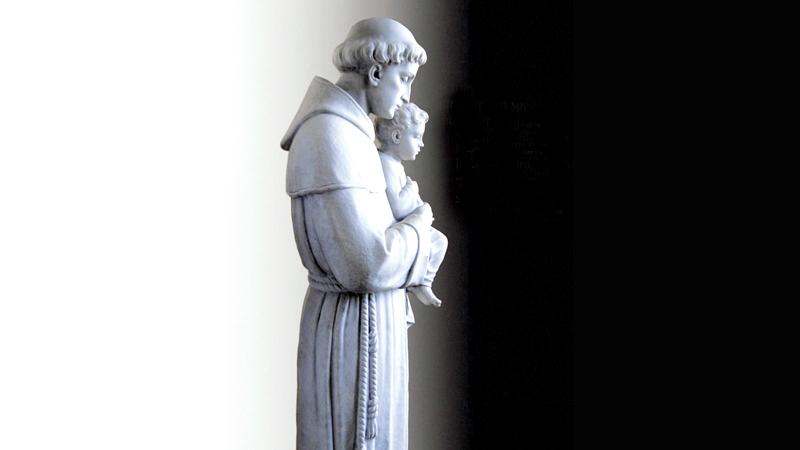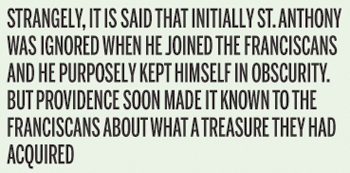
On June 13, Catholics as well as people of other faiths celebrate the feast of St. Anthony of Padua. He was born to wealthy parents in 1195 in Lisbon, Portugal and baptised as Fernando Martins de Bulhoes. His parents were devoted to the teachings of Jesus Christ.
At an early age, they enrolled him in the Community of Canons at the Cathedral of Lisbon where he received his education. When he was 15, he entered the Order of Regular Canons of St. Augustine near Lisbon, and after two years of study, went to the Convent of the Holy Cross of the same Order at Coimbra.
It is said that his pious mother was interested in watching her son come up in life in piety and holiness. When he completed five years, St. Anthony vowed his virginity to his heavenly Mother.
His affection for the Most Holy Sacrament was the admiration of all. St. Anthony later left the Augustinian Order and joined the Franciscan monks at the Holy Cross Monastery in Coimbra. Here, he was given the name Anthony. He nurtured the progress of Franciscan Theology by introducing the teachings of St. Augustine to the Friars and this, eventually, became the School of Theology at the University of Bologna.
St. Anthony was inspired by the Franciscan monks who travelled to Morocco to preach. Sadly, they were martyred and their bodies were returned and St. Anthony was urged to replace them. The Franciscans allowed St. Anthony to go to Morocco but unfortunately he was infected with malaria and was forced to return home. The ship he was travelling faced bad weather and had to dock in the island of Sicily.
 God himself entrusted the Seal of Miracles upon the work and the preaching of St. Anthony. He was endowed with the gift of languages and bilocation. He cured the sick and restored broken limbs and raised the dead to life.
God himself entrusted the Seal of Miracles upon the work and the preaching of St. Anthony. He was endowed with the gift of languages and bilocation. He cured the sick and restored broken limbs and raised the dead to life.
St. Anthony travelled all over Italy and France preaching and teaching the people and the
Friars and attracted many. He preached against the heresies of the day so passionately that he was called ‘The Hammer of the Heretics’. It was with the arrival of the Portuguese Franciscan Missionaries in 1543 that the unending devotion to St. Anthony reached our shores.
They preached it far and wide in the maritime provinces of the island. As a result, St. Anthony, the greatest in the Kingdom of Heaven is honoured even today on June13, the day of his funeral in Padua or in the month of June in churches dedicated to him.
Strangely, it is said that initially St. Anthony was ignored when he joined the Franciscans, and he purposely kept himself in obscurity. But providence soon made it known to the Franciscans about what a treasure they had acquired. He was made Professor of Theology, which subject he subsequently taught at Bologna, Toulouse, Montpellier and Padua.
Subsequently, St. Anthony stopped teaching to dedicate himself entirely to the task of preaching, for he was an accomplished orator and filled with zeal for souls. In his preaching missions he travelled extensively through France, Spain and Italy.
St. Anthony was inculcated with several important dignities in his Order and always laboured hard to preserve the monastic discipline. He was endowed with the God-given gift of miracles, which he performed while alive.
He had the gift of prophesy, bilocation, the gift of tongues and the ability to create rain and storms. St. Anthony was also able to raise the dead to life. These God-given mystical gifts made him a wonder of awe for the people to deeply respect and honour him. He also performed miracles with the Eucharist.
St. Anthony has been given a number of impressive titles. They include ‘The Wonder Worker of Padua’, ‘Evangelical Doctor’ and the ‘Hammer of Heretics’. He acquired all the qualities that characterised an eloquent preacher; a loud and sonorous voice, a winning countenance, a wonderful memory and profound learning to which were added the spirit of prophesy and an extraordinary gift of miracles. Such things convince us that it is impossible either to eliminate or explain them without doing violence to the facts of history.
The whole world stakes claim to St. Anthony being its own, but his native city of Lisbon, Portugal takes joy in naming him its most saintly native son.
St. Anthony of Padua is known to be a protector of souls in Purgatory, a propitiator of happy marriages, defender of animals, defender of lost property and miraculous configurations of popular imagination. St. Anthony died in a convent in Areella near Padua, Italy in 1231.
After the demise of this popular saint, the miracles that worked at the tomb were so prodigious that the Bishop of Padua requested the Vatican for his canonisation.
An inquiry was instituted without delay and by an exception considered as unparalleled in history, Pope Gregory IX on May 30, 1232 pronounced the decree of Canonisation a mere 11 months after St. Anthony’s death, at the Cathedral of Spoleka.
In 1946, Pope Pius XII raised St. Anthony to the dignity of a Doctor of the Church under the title of ‘Evangelical Doctor’.
Today, one among many saints of the church, St. Anthony could be regarded as a complete saint inculcated with all the qualities that a saint should possess. His life gives all concerned an example of a holy being much devoted to the needs and lives of millions of his followers.
